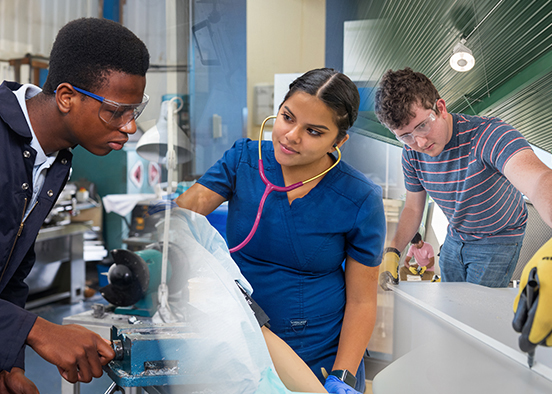More than 1,000 residents of Southwest Florida are expected to land new or better-paying jobs after receiving fast-tracked training and credentials. It’s thanks to a Florida Gulf Coast University project made possible by nearly $23 million in federal funding, which represents the largest grant in FGCU history.
In cooperation with FutureMakers Coalition at Collaboratory and other regional partners, FGCU will develop workforce training programs designed to help unemployed and underemployed Southwest Floridians quickly obtain the qualifications necessary for jobs in four of the region’s primary or emerging industries – health care, education, manufacturing, and transportation, distribution and logistics.
The three-year, $22.9 million grant from the U.S. Department of Commerce’s Good Jobs Challenge is a “game-changing, once-in-a-lifetime opportunity” to transform the economy of Southwest Florida by boosting the number of skilled workers in those key industries, grant recipients say.
“Sometimes there are unintentional and invisible barriers for individuals seeking to get into these jobs,” said Aysegul Timur, FGCU vice president and vice provost for strategy and program innovation. “Through this initiative, we will begin to identify where these barriers are and try to remove them across the region so that we can really increase and improve the talent pool in our part of the state.”

Timur and her grant partners will spend the next six months or so continuing conversations with representatives of regional businesses, schools and nonprofit agencies for an in-depth skills gap analysis and determine what type of specialized training is most critical for Southwest Florida’s leading and emerging industries.
That initial phase will be followed by the design and implementation of training programs that will provide workers with the skill sets necessary to create a sustainable pipeline of talent not only for existing positions, but also for jobs of the future.
“We are talking about ‘up-skilling,’ ‘re-skilling’ and ‘fast-skilling’ the workforce of our region, especially within those underserved members of our communities,” said Amir B. Ferreira Neto, assistant professor of economics and director of the Regional Economic Research Institute in FGCU’s Lutgert College of Business.
“This effort will result in short-term credentialing, not necessarily four-year college degrees. In some cases, four-year degrees may be the natural progression of careers, but that is not the case for all careers. The main goal is to help workers get the credentials they need as quickly as possible and get them to work as quickly as possible in well-paying jobs,” said Neto, the grant’s principal investigator.
Although FGCU and FutureMakers Coalition have taken the lead in writing the grant proposal, the now-funded initiative represents a true regional partnership, organizers say.
In addition to the critical role played by business and industry representatives who are helping identify employee skills gaps, many have committed to hiring new workers after they have received the recommended training. Nonprofit and human services agencies also are key to the project’s success, said Tessa LeSage, director of FutureMakers Coalition.
“An important aspect of this effort will be providing navigators to help adult learners reconnect with education in order to get into a new career or advance in their current situation, and then work with our partners to provide wrap-around support to them,” LeSage said. “There are a lot of reasons why people don’t finish their education or don’t go back to school because sometimes life just gets in the way.”
For example, nonprofit and human services agencies will help funnel into training programs members of homeless families who are looking to improve their lives, adult learners needing assistance with child care, people with no means of transportation, military veterans seeking new opportunities and those who may be struggling with mental health issues.
While the EDA grant funding continues through 2025, the initiative it is making possible – christened the Southwest Florida Equitable Jobs Pipeline – should continue to have a positive impact on the region’s economy for years to come, FGCU’s Timur said.
“Southwest Florida is growing tremendously,” she said. “Good, strong talent means building business, and building business means good economic development across the region. We believe this project is going to help us strengthen relationships with educational partners and industry leaders, and we believe that having a strong talent pool as a result of those relationships will attract more businesses in the future.”
FGCU’s Amir agreed. “A more-educated community with people who are in well-paying jobs equals a healthier, wealthier community, and that will create a spill-over effect,” he said. “When businesses and individuals are spending more money in the community, that strengthens the economy, which in turn attracts new businesses and services to the region that need to hire new people, further strengthening the economy.”
LeSage of the FutureMakers Coalition said she is optimistic about the long-term impact of the initiative. “I have lived in this area for my entire life. I feel like this is an opportunity to show the world what Southwest Florida can do when we all work together.”
- Learn more about the Equitable Jobs Pipeline